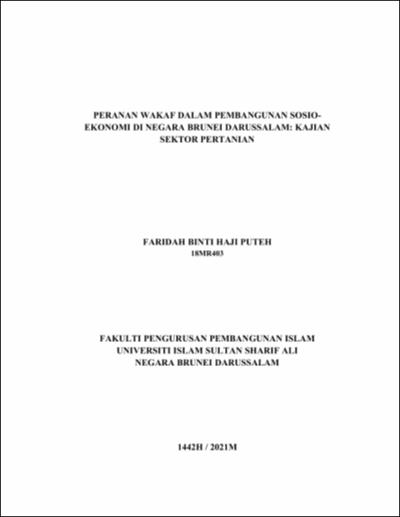Peranan Wakaf dalam Pembangunan Sosio-Ekonomi di Negara Brunei Darussalam: Kajian Sektor Pertanian

Date
2021Author
Faridah binti Haji Puteh
Abstract
Waqf is a commendable and demanding practice of Islam in the hope of a lasting reward from Allah Subhanahu Wa Ta'ala. Waqf is also one of the most important sources of Islamic socio-economic development since the beginning of Islamic rule and it must be developed in the best way for the well-being of the Muslim world. The role of waqf as a whole is not only in the purpose of religious aspects, but also in contributing to socio economic development including education, health, agriculture and so on. This study focuses on the role of waqf in the agricultural sector. Therefore, this study has been conducted for the purpose of studying the role of waqf in socio-economic development in Brunei Darussalam especially in the agricultural sector. For data collection, this study used qualitative method based on in-depth interview method and document analysis. In this study, a total of five respondents from selected government bodies were interviewed that related to the study. Data in this study was analyzed using the Nvivo 12 application. The findings showed that the management of waqf for agriculture in Brunei Darussalam has not been undertaken due to various challenges that exist. Thus, this study also seeks to propose a model of sustainable agricultural waqf management that is likely to promote and stimulate socio-economic development. The hope of this study is to open the eyes of the public on the role of waqf in socio-economic development especially in the agricultural sector in helping to develop the country and to build the well-being of people.
Collections
Alternative Title
Role of Waqf in Socio-Economic Development in Brunei Darussalam: Agriculture Sector Study

